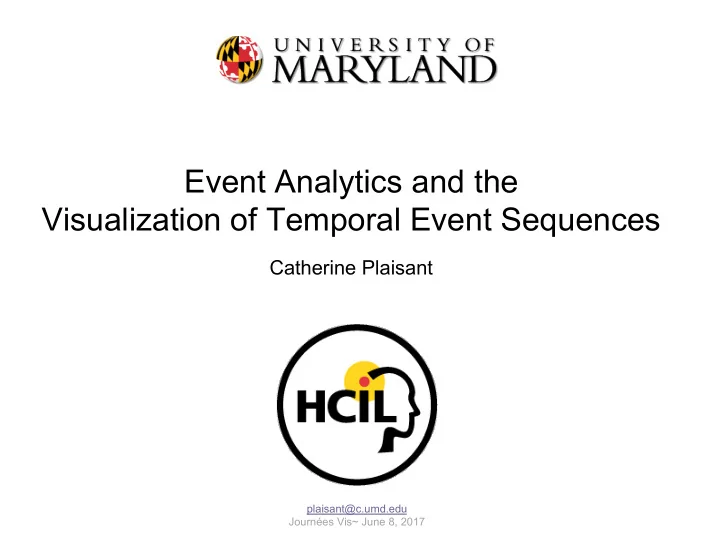

Event Analytics and the Visualization of Temporal Event Sequences Catherine Plaisant plaisant@c.umd.edu Journées Vis~ June 8, 2017
ENSAM
& Jenny Preece Ben Shneiderman Research collaborator for 30 years
Information visualization Home Finder and Filmfinder prototypes lead to SpotFire Hierarchical Clustering Explorer HCE Treemap Lifelines SpaceTree
Event Analytics
Numerical Categorical Patient ID: 45851737 Patient ID: 12345 04/26/2010 10:00 31.03 12/02/2008 14:26 Arrival 04/26/2010 10:15 31.01 12/02/2008 14:36 Emergency 04/26/2010 10:30 31.02 12/02/2008 22:44 ICU 04/26/2010 10:45 31.08 12/05/2008 05:07 Floor 04/26/2010 11:00 31.16 12/14/2008 06:19 Exit Time Arrival Emergency ICU Floor Exit + intervals e.g. High/Normal/Low
Prototype evolution Tool l Event nt Re Records Di Displa lay y Typ ypes LifeLines Points, One Individual Intervals LifeLines2 Points Many Individual, Summary Similan Points Many Individual LifeFlow Points Many Individual, Aggregate EventFlow Points, Many Individual, Intervals Aggregate www.cs.umd.edu/hcil/ toolname
Many application domains Electronic Health Records : symptoms, treatment, lab test Student records : course, paper, proposal, defense, etc. Web logs, usability logs, security etc. Traffic incident logs : confirmed, unit arrived, lane closed etc.
A SINGLE RECORD What is the situation? What has been done? What should we do now?
MULTIPLE RECORDS R Are we following guidelines? E C O R D RECORD Do you have patients for my clinical trial? RECORD Retrospective analysis: How are opioids prescribed? Patterns of readmissions? Drug adverse reactions? RECORD How can we improve care? RECORD
A SINGLE RECORD
LifeLines – Single Patient http://www.cs.umd.edu/hcil/lifelines
1753 Jacques Barbeu Du Bourg - 1753 http://gallica.bnf.fr/ark:/12148/bpt6k1314025
Controlled experiment 36 participants used either LifeLines or Tabular display (static display only) ● Series of tests: ● first impression, 31 question quiz, subjective satisfaction questionnaire, recall test, spatial ability Alonso, D., Rose, A., Plaisant, C., Norman, K. Viewing Personal History Records: A Comparison of Tabular Format and Graphical Presentation Using LifeLines Behavior and Information Technology 17 , 5, 1998, 249-262.
Strong benefits • LifeLines twice as fast for many tasks (e.g. time interval comparison, or task across categories) • B etter recall 4.3 vs 2.8 correct out of 6 questions • More accurate “1st impression”
MULTIPLE RECORDS R E C O R D RECORD RECORD RECORD RECORD
Constructing the EventFlow Overview A B C E D
Number of Records Time
EventFlow ~ e.g. Transfers within Hospital
Children’s Hospital in DC: Trauma Bay
Primary Survey (ABCDE) A irway Identify and manage life-threatening B reathing conditions in a sequential manner C irculation D isability E xposure 33 33
Secondary Survey Head to Begins once Toe Primary Survey is Examinati complete and on patient is stable 34 34
At first … Confetti. Need strategy to get answers skip
Focusing on the first two events 84% of patients are checked in the correct order. The most common deviation is that the breathing is checked before the airways (14% of patients) Reversed group takes longer on average than the correct sequence
Distributions
Adding third event type (central pulse)
Combine the 2 pulse types Adding distal pulse
Graphical search & replace to remove duplicates
81% of the patients are treated in the correct order. The largest deviation is still the airway and breathing being out of order, but there are also instances where the circulation is checked too early .
Add disability check 78% of patients treated in the correct order …
The average time between steps continues to be longer for the reversed airway and breathing check groups. The time between circulation and disability checks is about 1 minute for the correct sequence and 2 minutes and 15 seconds for the reversed order group.
Searching with a time constraint. See where check is taking longer than one minute > 1 min
Add secondary survey Correct procedure drops to only 48% of patients,
Other example in collaboration with Army PharmacoVigilance Center Analysis of prescription patterns of asthma medication
20 case studies
20 case studies 15 strategies Du et al. (2017) Coping with Volume and Variety in Temporal Event Sequences: Strategies for Sharpening Analytic Focus IEEE Transactions Visualization and Computer Graphics
Event Analytics Eventflow to: review the data from individual records search for temporal patterns of interest summarize all the event sequences perform data transformations select cohorts of interest for further studies see also lots of other projects in event analytics e.g. workshop at IEEE Vis 2016
Merci Thank you to U. of Maryland colleagues Ben Shneiderman Fan Du, Sana Malik Megan Monroe, Krist Wongsuphasawat, David Wang + all case study partners plaisant@cs.umd.edu hcil.umd.edu/eventflow Contact me for software access FYI: full day course June 30 th www.aviz.fr/DayCourse2017/EventAnalytics
Common question: Comparison of 2 groups of records. Two Eventflow side by side (hard to find differences)
Cohort Comparison: Coco www.cs.umd.edu/hcil/coco
Cohort Comparison: Coco www.cs.umd.edu/hcil/coco
Recommend
More recommend